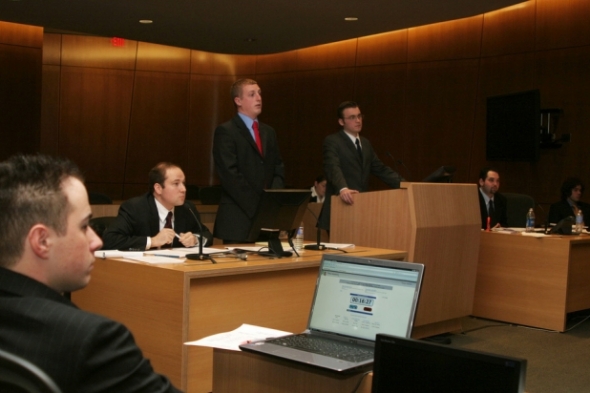In late February 2013, the Audit Unit of the California Division of Workers Compensation provided a newsline release which dealt with good faith negotiations and liens. The release stated:
The Audit Unit of the Division of Workers' Compensation has received an increasing number of complaints from individuals and entities providing services on a lien basis in workers' compensation claims. The complainants report that some payors have adopted a policy of refusing to discuss negotiating the provider's liens until the provider of the services demonstrates it has filed a lien with the WCAB and paid the applicable lien filing or activation fee required by the enactment of SB 863. Such a policy is both unsupported by the plain language of Labor Code sections 4903.05 or 4903.06, and directly contrary to the legislative intent of those sections and existing law.
If a claims administrator has reasonable grounds to contend that nothing is owed, then good faith negotiation does not necessarily require an offer of compromise. In the absence of a good faith contention that nothing is owed, however, a refusal to negotiate prior to payment of the filing fee would not be in good faith.
Additionally, Title 8, California Code of Regulations, section 10109(e) mandates that "[a]ll Insurers, self-insured employers and third-party administrators shall deal fairly and in good faith with all claimants, including lien claimants."
Title 8 California Code of Regulations, section 10250(b) requires a moving party state under penalty of perjury that the moving party has made a genuine good faith effort to resolve the dispute before filing the Declaration of Readiness (DOR). Forcing a provider to file a lien and pay the filing or activation fee before the payor will discuss informal resolution of their billing amount prevents the provider from complying with this mandate. Such conduct could expose the payor to the imposition of sanctions, attorney's fees and costs under Labor Code section 5813. This practice also exposes the payor to audit penalties for violation of Title 8, California Code of Regulations, section 10109(e). As is the Audit Unit's existing practice, the Audit Unit will review all complaints received about this practice during the next random or targeted audit of any payor about whom such a complaint has been received.
This release has prompted quite a bit of commentary. Most have discussed the impact the directive will have on the ongoing lien problem that plagues the Workers' Compensation system in California as a whole. Many comment on the sins of the defense-side of the system. Shortly after I read this release, I read a blog update from David DePaolo, President and CEO of WCCentral. If you do not read Mr. DePaolo's blog or his updates, I would encourage you to do so. They are excellent reading. In his blog article, he stated that the Division of Workers Compensation has finally listened to the various lien claimant representatives who are complaining that the defense is not negotiating in good faith with them when they contact examiners regarding their liens. He had previously written a blog on what he argued was "despicable behavior."
I acknowledge that there are claims examiners and other support staff who may not deal in good faith when it comes to liens. However, does the blame for the inability or refusal to negotiate in good faith fall solely at the feet of the defendant? As a former claims examiner, I would loudly proclaim, "No!" There are two sides to the story. It is time to examine both.
SB 863 brought back a common sense approach to liens. Lien claimants can no longer simply paper a defendant with a green (or any other color) lien sheet and "claim" a lien is filed. They now must demonstrate they are a proper lien claimant by paying a filing fee to activate new or existing liens, and prove to both the payor (defendant) and the Workers' Compensation Appeals Board that they are justified in their demands for the time needed to negotiate.
Further, as the Torres decision states, they must also prove up their lien and assertion that the recovery they are seeking is due and proper. I would also argue that the Torres decision shed some light on one of the biggest challenges to negotiating liens: a lack of solid proof provided by the lien claimant. I believe it was the intent of SB 863 to take large steps to end frivolous lien filings and lien practices that clog every Workers' Compensation Appeals Board across the State.
The Division of Workers Compensation claims that requiring a lien to be filed and activation fee to be paid before lien negotiations commence is contrary to the plain language of Labor Code § 4903.5 and § 4903.6, as well as the legislative intent behind those sections and existing law. These sections deal with time frames and a statute of limitations for lien claimants to file their liens. They also protect the injured worker from the underlying obligation to pay for the service if a lien is not properly filed.
In my reading of these Labor Code sections, nowhere do I see an obligation for the defendant to address liens without a proper filing, as they can pay their fee well before the requirement to file a Declaration of Readiness is completed. In fact, these sections specifically require the lien claimant to adhere to the requirements of filing and proof of the same. SB 863 instructs the lien claimant to activate a lien by paying the fee.
The Division of Workers Compensation also states that a requirement to pay the activation fee prevents the lien claimants from negotiating in good faith prior to filing for a hearing. How does requiring the payment of a lien fee prevent the lien claimants from later asserting they could not negotiate in good faith prior to filing a Declaration of Readiness? I would argue that the filing fee lets the defendant know that the lien claimant is a proper party to the action. The lien claimant is not required to pay the filing fee at the same time the Declaration of Readiness is filed. The Division of Workers Compensation appears to indicate otherwise. Lien claimants have every opportunity to file their activation fee and then negotiate with the defendant over genuine disputes regarding payment and services.
We must also remember that SB 863 placed safeguards for lien claimants to recover filing fees as well as interest. They simply need to make a demand 30 days prior to filing a Declaration of Readiness. If the defendant fails to respond within 20 days and the Workers' Compensation Appeals Board and/or arbitrator eventually awards the amount of the original demand or more, they will be able to collect. Therefore, it appears the intent of the legislature was to hold both the lien claimant and the defendant accountable for good faith actions.
The lien claimant acts in good faith by paying a filing fee to activate their lien and then make a good faith demand. The defendant then has the responsibility of addressing the demand and negotiating in good faith, or pay the price for the failure to do so. I would add that the Division of Workers Compensation requires that a lien claimant file their activation fee and show proof of payment prior to the filing of a Declaration of Readiness, or by the date of the lien conference if they are not the party who filed for the hearing. See instructions at http://www.dir.ca.gov/dwc/liens.htm.
We have already seen a host of cases where lien claimants were dismissed for failure to show proof of their activation payment either at the time they filed the Declaration of Readiness or alternatively, prior to the hearing. However, we have also seen instances where the Workers' Compensation Appeals Board allows lien claimants to file on the morning of the hearing, even when the lien claimant was the party who filed the Declaration of Readiness. Why are we asserting a lien filing fee under SB 863 if we are permitting lien claimants to file and then argue on the day of court they are in "compliance" because on the morning of, or immediately prior to the hearing, they paid their filing fee?
Greg Jones of www.workcompcentral.com recently published statistics on the surge in liens filed in the latter half and most notably, the final quarter of 2012. His article stated that the largest unknown is how many of the liens filed will be "activated" and what the impact of the filing fee has on liens. Recall for liens filed after 1/1/13, the $150 activation fee applies. For liens filed before 1/1/13, it is $100. In both instances, the fees do not have to be filed until the matter is addressed at a hearing, or as late as 1/1/14. That allows for up to an entire year of negotiations on what would be considered an "inactive" lien. I see the mass filings in 2012 as evidence that lien claimants do not wish to process the filing fee. At the same time, they demand the defendants deal with them regardless of whether or not their liens are active.
I believe there were good intentions behind the Division of Workers Compensation's mandate. They are letting everyone know that negotiation during the claims process benefits everyone. And, it will help relieve the unbearable pressure the Workers' Compensation Appeals Board presently faces from dealing with an endless sea of liens. That being said, defendants should consider exactly what "good faith" really means, and how certain scenarios could result in a different number of conversations. I can assure you that your definition and the definition of most lien representatives will be different.
With all of this in mind, let us discuss specific scenarios and recommendations.
- Negotiation during active treatment: I would argue that unless the case has been settled and the treatment is future medical in nature, or if the lien claimant can document they will not treat the applicant again, the lien cannot be addressed. Some examples would be certain diagnostic testing, former physical therapy locations, or prior treating physicians.
- Future treatment: If you are negotiating prior to the resolution of the claim, ensure that the lien claimant will not be providing treatment in the future if at all possible. It makes no sense to deal with a new lien from the same lien claimant.
- MPN arguments: If the treatment is based on non-MPN care, and if you can establish a proper Medical Provider Network was in place and proper notices were provided, litigate the Medical Provider Network issue as soon as possible. Prior to medical-legal evaluations and prior to the lien drastically expanding in size, as we know it will.
- Petitions vs. liens: Certain groups such as copy services and interpreters, are arguing that a Petition for Costs is appropriate for their services. This is an ongoing issue that will require further litigation. At minimum, I would argue that if this is asserted after the case in chief has resolved, they are too late to assert the Petition as one of the parties (i.e. the applicant) has resolved their portion of the claim.
- Claims notes: Document your files and claims notes often. Make your arguments clear and understandable. Claims notes can be used as evidence if needed. Also document calls when you leave a message.
- Appeals: If a lien claimant is arguing fee schedule with you, ask them to submit their bill and supporting documentation, with a proof of service, for an appeal of the claims administrator's prior findings. The appeal will either generate new money for the provider, or firm up your argument that nothing is owed.
- Zero dollars: If you truly believe nothing further is owed, it is not bad faith to assert the same. You paid per fee schedule. There is a Medical Provider Network issue. They have not proven their services were reasonable, approved, or rendered. The list is endless. The key is to document your case for $0.00 recovery and make sure your foundation actually exists.
- Help your cause: Provide your attorney with all Explanations of Benefits during administration of the claim and after the case has settled. Provide them with any and all objection letters and involve them in the ongoing objection and negotiation process. Your attorney will need these to negotiate in good faith.
- Aggressive representation: Make sure your attorney is aggressive. It may surprise you to know that the many providers use the same representatives to handle Workers' Compensation Appeals Board matters. Your attorney likely deals with a few people time and time again. They remember the aggressive attorney who knows their file. Additionally, make sure your counsel is not too cozy with them. They can be polite and friendly. Your attorney should never speak ill of their client, or their position.
- Make them prove their case: Require the lien claimant serve you with all of their supporting documentation, not simply a bill and a report. If they intend on relying upon case law, statute, "usual and customary" arguments, or anything else, ask them to submit it to you prior to negotiation. They will ask the same thing from you. See the Torres decision.
- Assignments: Make sure the lien claimant or representative has complied with the rules regarding assignment. If they have not properly notified the parties of the assignment of the lien (or multiple assignments) a recommendation to dismiss the lien should be made at the time of hearing.
- Pick your date and time: The Division of Workers Compensation requires you negotiate in good faith. However, there is no requirement that negotiations must occur every day at any time. Many of my clients designate one or two days out of the week to devote to liens. In my opinion, this is acceptable, as long as you are actively answering the phone, or responding to a fax or email.
- Verify: If a lien claimant states that they have filed their lien activation payment, request it to verify. You are not asking for the lien filing fee to be paid. You are merely asking for verification to determine if a lack of filing fee will be an issue at the time of the hearing.
- Release the small fish: Resolving the very minor liens during the claims adjusting process will often make your outlook appear brighter. As the lien list shrinks to only a handful of large lien holders, the final lien process will seem more palatable.
I predict that an increasing number of lien claimants will assert that bad faith actions are taking place, even during active negotiations. Do not be afraid to assert that nothing more is owed if you have complied with bill review and timely payment, if your Medical Provider Network is secure, or if your arguments are sound. Otherwise, pick up the phone and talk.





